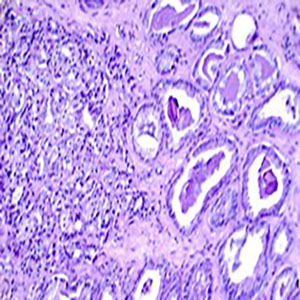Another PARP Inhibitor Combination Approved for Metastatic Prostate Cancer
The FDA approved a combination of the PARP inhibitor niraparib with a hormone therapy agent for certain patients with metastatic prostate cancer
The U.S. Food and Drug Administration (FDA) has approved the combination of niraparib and abiraterone acetate (Akeega) with prednisone for the treatment of patients with metastatic castration-resistant prostate cancer (mCRPC) carrying harmful or suspected harmful mutations in the BRCA1 or BRCA2 genes, as determined by an FDA-approved test.
Niraparib is a targeted therapy known as a poly (ADP-ribose) polymerase (PARP) inhibitor. The PARP enzyme is essential for repairing a certain type of DNA damage that affects one strand of the double helix. If left unrepaired, this type of lesion is converted into double-strand DNA damage, which is repaired through a mechanism called homologous recombination repair (HRR). The BRCA genes are part of the HRR pathway. In cells with defective HRR due to BRCA gene mutations, treatment with PARP inhibitors leads to excessive DNA damage and cell death.

Abiraterone acetate is a type of hormone therapy approved for prostate cancer. It works by inhibiting the production of testosterone, which drives the growth of prostate cancer cells.
Prednisone is a steroid given with abiraterone acetate to manage some side effects related to the treatment.
The approval of niraparib and abiraterone acetate with prednisone was based on results from MAGNITUDE, a randomized, double-blind, placebo-controlled phase III clinical trial that enrolled patients with mCRPC. Cohort 1 of the trial included patients whose cancers harbored mutations in HRR genes, while Cohort 2 included participants whose cancers did not have HRR gene alterations.
To be eligible for the study, participants had to have undergone surgical or chemical castration and could not have received prior systemic therapy for their mCRPC, with some exceptions.
Patients were randomly assigned to receive niraparib and abiraterone acetate plus prednisone daily or placebo and abiraterone acetate plus prednisone daily.
Of the 423 patients enrolled in Cohort 1, 225 had known BRCA gene mutations in their tumors. Among the patients with BRCA-mutated disease, the radiographic progression-free survival in the niraparib and the placebo treatment groups was 16.6 months and 10.9 months, respectively, which was a statistically significant difference and translated into a 47% reduction in the risk of death or radiographic progression.
In contrast, patients whose tumors did not have HRR gene alterations or that harbored mutations in other HRR genes had similar progression-free survival regardless of treatment, suggesting that the benefit of adding niraparib to abiraterone acetate with prednisone was restricted to the subgroup of patients with BRCA-mutated cancer.
In an exploratory analysis, patients with BRCA-mutated mCRPC in the niraparib arm had a 21% lower risk of death compared with patients in the placebo arm, with a median overall survival of 30.4 months and 28.6 months, respectively.
Other treatments for mCRPC combining a PARP inhibitor and hormone therapy have been previously approved. Olaparib (Lynparza) plus abiraterone (Zytiga) with prednisone or prednisolone was approved in May 2023 and talazoparib (Talzenna) plus enzalutamide (Xtandi) was approved in June 2023..
Prostate cancer accounts for 14.7% of all new cancer cases in the U.S. According to federal statistics, it was estimated that about 288,300 individuals would be diagnosed with prostate cancer and 34,700 patients would die of the disease in the U.S. in 2023.
The FDA rendered its decision on August 11, 2023.
